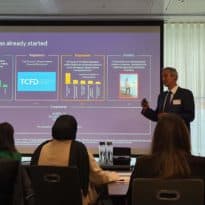Sustainable investing may be known for its values and principles, but there are other advantages for investors, says David Harrison, fund manager, Rathbone Greenbank Global Sustainability Fund
You probably don’t need me to tell you that Rathbones firmly believes companies that take sustainability seriously are the best performers over the long run. By now you probably have it memorised, which is no bad thing. You can say we are cheerleaders for the cause, but we certainly haven’t jumped on the bandwagon – a few of us were doing this before it was fashionable.
And that’s exactly our point. Responsible investing isn’t about being trendy or following a fad – it’s an ethos. Companies that have the best ESG scores tend to perform better than those that have poor scores, and there’s good reason for that. High-quality companies that have strong management teams are most likely to be thinking about sustainability, and this correlates with greater resilience and the potential for superior performance.
On the flip side, companies that are under financial stress, are struggling in the sector, or have personnel or other issues tend not score well on environmental, social and governance criteria. Quite often this is because their management teams have adopted short-termist views that make it difficult for the company to react quickly to changes in the market.
Think of it this way: sustainability by its definition is measured over the long term. If a company’s management team is only looking ahead to the next three months or perhaps even less, it seems impossible that they would also be carrying out forward planning across multiple economic cycles in the future.
Sustainability reaches beyond a company’s operations
We also need to remember that sustainability is not simply about how a company is operating or how it manages supply chains. That is just a starting point. It’s also about the type of business they are conducting and how they integrate into society, and the world, as a whole. Companies that think in this way make big changes that are positive for everyone, such as an automotive manufacturer that decides to stop producing internal combustions engines because of the problems associated with burning fossil fuels.
One thing we often say is that responsible investing is about doing the right thing for society and the environment. We aren’t simply investing in companies that are doing everything right; rather, we are choosing those that are supporting the UN Sustainable Development Goals and contributing to a better future. That means actively engaging with companies to ensure they are always improving.
Seeking the complete package
Of course, none of this guarantees glittering financial performance. A business can score well on ESG criteria, but it also needs to do well where the rubber meets the road. We want companies that have strong business models, operate in a sector with high barriers to entry – think wind turbines and semiconductors – and have resilient operations.
When we invest, we think of industries as ecosystems with lots of different players and operators. Within big topics and megatrends like electric vehicles and renewable energy, there are the obvious players – the household brands we all know – and the less obvious players that perhaps make a small component for a car or provide a service within an industry.
We are looking for the less obvious companies that are important to the ecosystem and are not easily replicated. These are the products and services that have high barriers to entry for competitors and are in high demand. Our thinking here is that these businesses will be a good source of long-term growth because they are protected to some degree by a wide moat and strong demand.
ESG investing may seem like the flavour of the month right now, but unlike the dot-com bubble or Florida real estate, it is underpinned by genuine value. Our job is to focus on doing the right thing and not be swayed by short-term noise.


































